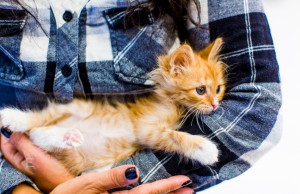Foster Volunteer information page
May 1st, 2019 in
For a printable version of the information on this page, click here
Download a foster application and experience assessment
Click here to complete the required Volunteer application/release
Cat Matchers – Foster Care Program Overview
Thank you for your interest in our Foster Care Program. We appreciate your willingness to open your heart and home to homeless cats and kittens. Your dedication allows our organization to rescue cats that we would otherwise have to turn away due to limited space in our volunteer foster homes.
Importance: The foster care program is vital. The guiding mission of the Foster Care Program is to give cats individualized care and socialization to prepare them for adoption. Information gathered during the foster process helps us place cats in homes and with families who are the best match for their personality and temperament.
Specific goals of the program include:
- Providing a safe, healthy, nurturing environment for mother cats to raise their kittens.
- Socializing shy or timid cats and kittens.
- Allowing sick or injured cats to heal in a relaxing, uplifting environment.
- Nursing and bottle-feeding orphaned or abandoned kittens.
Time involved: This will depend on the needs of each animal. Time required depends on:
- The number of animals in foster care.
- The age of the foster cat/kitten(s).
- The health of the cat(s). Many foster pets are healthy and adoptable so time expended is minimal.
- A minimum 10 day quarantine from time of intake to eligibility for adoption.
- Transporting cats to veterinarian appointments as needed.
- Transporting cats to mobile adoptions at least once a month.
Qualifications:
- Most important is love and concern for pets.
- Time and desire to socialize pets.
- Willingness to provide food, water and medication, if necessary.
- Provide a clean living environment and daily care.
- Other animals in the home must be current on all vaccinations, and neutered as age appropriate.
- Have a place in the home where the foster cat(s)/kitten(s) can be separated from animals currently living in the home.
Where we get our cats/kittens:
First and foremost we rescue from local animal shelters as their space and time constraints are limited. We also work with strays and owner surrendered animals at times. Cats/kittens entering our system from any person/group must be first approved by the foster coordinator or President
Types of cats needing foster homes
- Kittens too young and/or immature to be adopted.
- Kittens and young cats that require more socialization than available at the shelter.
- Older or senior cats that will be more comfortable in a home environment.
- Injured cats and/or those recovering from surgery.
- Neglected or abused cats that need tender loving care.
- Cats suffering from “shelter stress” in need of a calming home environment.
- Cats with colds or with special medical needs.
- Abandoned mothers with litters of kittens.
- Any cat when the shelter becomes overcrowded.
Categories of fosters
- Bottle feeding (under 5 weeks old)
- Young kittens– but can eat on their own (5 weeks to 4 months)
- Adolescents (4 months – 8 months)
- Pregnant cat or Moms with their litter
- Adults (8 months old and older)
- Injured and/or ill cats/kittens
- Semi-feral and shy cats/kittens
How we adopt:
- We post our adoptable animals on our website as well as petfinder.com and other adoption websites.
- We run mobile adoptions and attend special events.
Expense: Many foster volunteers provide their own food, litter and other necessities for the animal – as this can be considered an “in-kind” donation for tax purposes, however, Cat Matchers will provide everything, if necessary. Cat Matchers will arrange for and pay for all approved medical care.
Training: Much of the foster care program is a “learn on the job” type atmosphere. You will be assigned a mentor to help you with any questions. There is a handbook to cover many topics. We try to start new foster volunteers with an easier “assignment” to make the first time foster experience positive.
Duties:
- Aid in the care of healthy adults and young animals.
- Aid in the care of sick, injured or very young animals.
- Provide food, water, litter and other necessities.
- Medicate the animal, if necessary; take to the veterinarian, if necessary.
- Bring the animal to at least one adoption event a month.
- Communicate with foster coordinator and marketing team about the foster to facilitate adoption.
